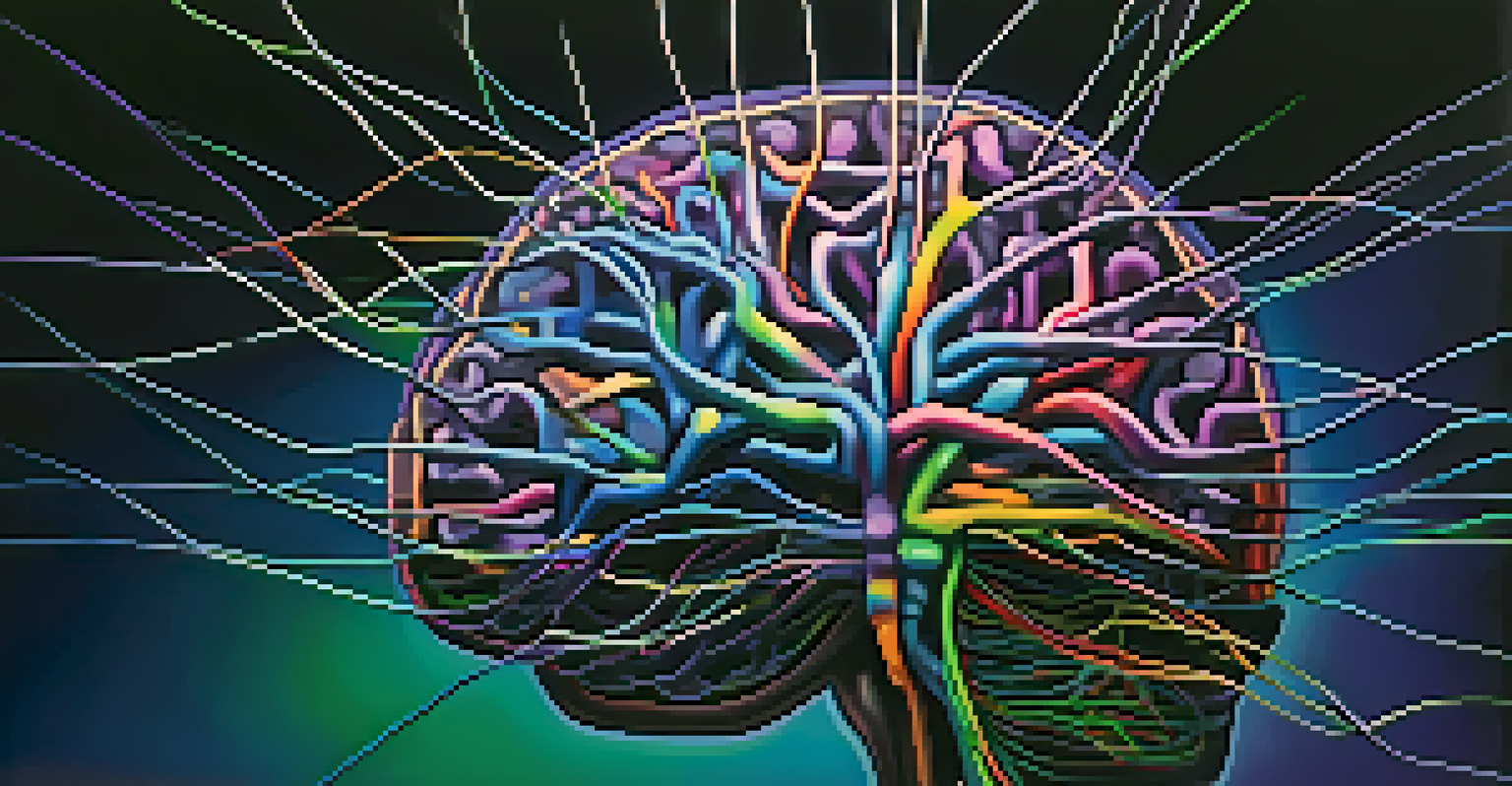The Role of Psychedelics in Understanding Human Consciousness

Understanding Human Consciousness: A Complex Puzzle
Human consciousness is often described as one of the greatest mysteries of science and philosophy. It's the essence of our thoughts, feelings, and experiences, but defining it can feel like trying to catch smoke with your bare hands. Consciousness encompasses everything from basic awareness to profound experiences of self and the universe. As we delve into the role of psychedelics, it's crucial to first grasp this intricate concept.
Consciousness is the greatest mystery of the human experience, and psychedelics offer a unique lens through which to explore it.
Different cultures and thinkers have approached consciousness in various ways, from ancient philosophies to modern neuroscience. Some argue that it is merely a byproduct of brain activity, while others believe it holds deeper significance. This ongoing debate highlights the need for innovative methods to explore consciousness, which is where psychedelics come into play. They offer unique insights that challenge conventional understandings.
By exploring altered states of consciousness, we can begin to unravel the layers of our minds. Psychedelics have been used for centuries in rituals and therapeutic contexts, providing glimpses into the depths of our psyche. They serve as a bridge between subjective experience and scientific inquiry, making them invaluable tools for understanding what consciousness truly is.
Psychedelics: A Brief Overview of Their History
Psychedelics, substances that alter perception, mood, and cognitive processes, have a rich history that dates back thousands of years. Indigenous cultures have long utilized plants like peyote and psilocybin mushrooms for spiritual and healing purposes. These practices were often intertwined with community rituals, emphasizing the connection between individuals and the cosmos.

In the mid-20th century, psychedelics gained attention in Western cultures, particularly during the counterculture movement. Researchers began to explore their potential therapeutic benefits, leading to a surge in interest. However, the subsequent backlash and legal restrictions stifled this research for decades, relegating psychedelics to the fringes of society.
Psychedelics as Consciousness Tools
Psychedelics provide unique insights into consciousness by altering perception and facilitating profound experiences.
Recently, there's been a renaissance in psychedelic research, with scientists revisiting their potential to address mental health issues. This revival has sparked curiosity about how these substances can help us understand consciousness, making it a timely conversation in today's scientific landscape.
The Science Behind Psychedelics and Consciousness
Psychedelics primarily affect serotonin receptors in the brain, particularly the 5-HT2A receptor, which plays a key role in mood and perception. This interaction can lead to profound changes in consciousness, often resulting in experiences that feel deeply spiritual or transformative. Understanding this science is crucial for comprehending how psychedelics can unlock new dimensions of awareness.
Psychedelics are not just tools for healing; they are keys that unlock the door to deeper understanding of who we are.
Research indicates that psychedelics can promote neural connectivity, allowing different parts of the brain to communicate in ways they normally wouldn't. This phenomenon can lead to a dissolving of the ego, a state where individuals feel a sense of unity with their surroundings. Such experiences can provide insights into the nature of self and consciousness, challenging our usual perspectives.
Moreover, studies have shown that psychedelics can catalyze lasting changes in personality and behavior, suggesting they have the potential to alter consciousness beyond the immediate experience. This raises fascinating questions about the malleability of consciousness and the role psychedelics might play in personal growth and understanding.
Psychedelics in Therapy: Healing the Mind
One of the most promising areas of research surrounding psychedelics is their application in therapy. Clinical trials have shown that substances like psilocybin and MDMA can significantly alleviate symptoms of depression, anxiety, and PTSD. This has led to a reevaluation of how we approach mental health treatment, highlighting the importance of consciousness in healing.
The therapeutic process often involves guided sessions where patients navigate their thoughts and emotions under the influence of psychedelics. This creates a unique environment for introspection and emotional release, allowing individuals to confront issues that may have been buried. The insights gained during these sessions can lead to transformative experiences that foster healing.
Therapeutic Potential of Psychedelics
Research shows psychedelics can effectively alleviate mental health issues like depression and PTSD, reshaping therapeutic approaches.
As more studies emerge, the potential for psychedelics to reshape mental health treatment becomes increasingly clear. By understanding the link between altered states of consciousness and therapeutic outcomes, we may unlock new pathways to healing that are both effective and compassionate.
Exploring Altered States and Mystical Experiences
Many users report profound mystical experiences while under the influence of psychedelics, characterized by feelings of interconnectedness, transcendence, and deep peace. These experiences can be life-changing, often leading to shifts in perspective and priorities. Such encounters provide a rich area for exploration when considering the nature of consciousness and the human experience.
Research suggests that these mystical experiences can have lasting positive effects on individuals, promoting greater well-being and life satisfaction. They often inspire a sense of purpose and connection to something greater than oneself. This raises intriguing questions about the potential for psychedelics to help us tap into the deeper currents of consciousness that lie beneath our everyday awareness.
By studying these altered states, scientists hope to better understand the mechanisms of consciousness itself. What do these experiences reveal about our minds, our beliefs, and our place in the universe? The answers may not only enhance our understanding of consciousness but also offer valuable insights into the human condition.
Ethical Considerations in Psychedelic Research
As interest in psychedelics grows, so do the ethical considerations surrounding their use in research and therapy. Ensuring the safety and well-being of participants is paramount, as the experiences can be intense and potentially unsettling. The importance of informed consent and proper screening cannot be overstated, as these factors help mitigate risks associated with psychedelic use.
Moreover, the cultural appropriation of indigenous practices raises questions about respect and acknowledgment. Many psychedelic substances have deep cultural roots, and their commercialization can lead to exploitation. It's essential to approach these substances with sensitivity and a commitment to honoring their histories.
Ethics in Psychedelic Research
The growing interest in psychedelics raises important ethical considerations, including participant safety and cultural respect.
Finally, there's the question of accessibility. As psychedelic therapies become more mainstream, ensuring that these treatments are available to those who need them is crucial. Balancing research, ethical considerations, and societal benefits will shape the future landscape of psychedelics and their role in understanding consciousness.
The Future of Psychedelics and Consciousness Research
Looking ahead, the potential for psychedelics to enhance our understanding of consciousness is vast. As research expands, we can expect new discoveries that challenge existing paradigms and illuminate the complexities of the mind. The combination of traditional wisdom and modern science may lead to breakthroughs that redefine our understanding of consciousness.
Emerging studies are beginning to explore not just the therapeutic benefits, but also the implications of psychedelics on creativity, problem-solving, and even the nature of reality itself. This intersection of science and spirituality could pave the way for a new era of exploration into the human experience. Imagine a future where psychedelics are not only accepted but embraced as tools for insight and growth.

As we continue to navigate the landscape of psychedelics and consciousness, fostering open dialogue and collaboration will be essential. The journey is just beginning, and the possibilities are as expansive as the human mind itself.